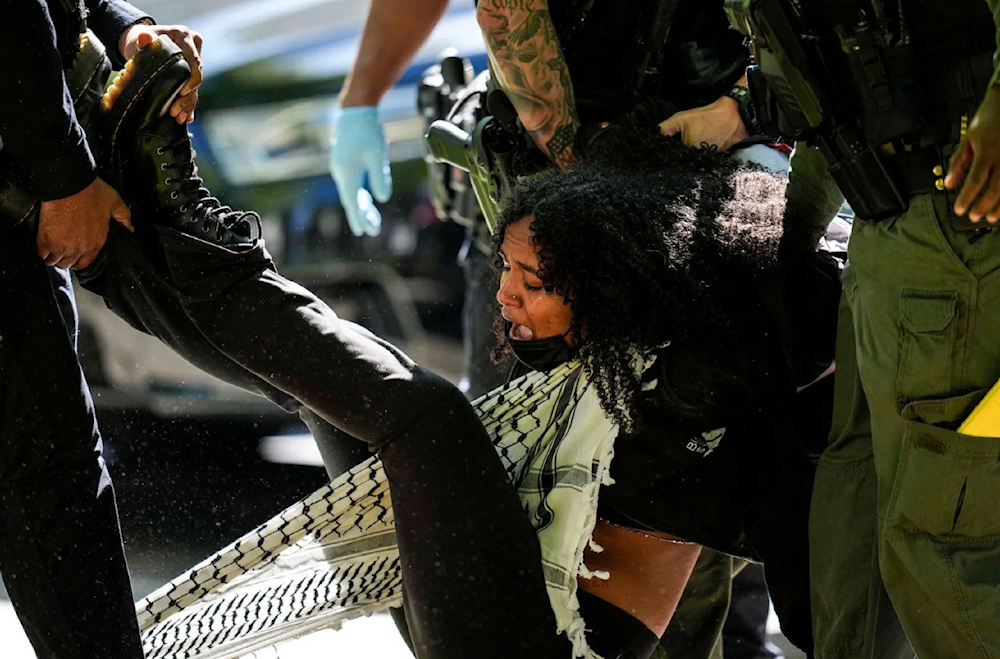New report shows pro-Palestine protests suppressed in Democracies
A report by CIVICUS Monitor highlights global crackdowns on pro-Palestinian protests, with authorities using excessive force and suppression tactics.
-

Authorities detain a protester on the campus of Emory University during a pro-Palestinian demonstration on April 25, 2024, in Atlanta. (AP)
A new report by TIME magazine discussed a trend in civic liberties throughout the world: crackdowns on Palestinian solidarity marches in every kind of society, from the most open to the most closed.
Tara Petrović, author of a study by CIVICUS Monitor, a worldwide coalition of civil society groups headquartered in Johannesburg, highlights the war on Gaza's effect on civic space as a key lesson for the year. "We've seen expressions of solidarity and we've seen repression of these expressions of solidarity at pretty much every corner of the globe."
Western countries downgraded from 'open'
The annual CIVICUS study, People Power Under Attack, assesses civic space in 198 nations, ranging from "open" to "repressed," and discovered that approximately one-tenth of the protests blocked by authorities referenced "Israel's" war on Gaza, or solidarity with the Palestinian people.
Global protests have erupted following the ongoing onslaught on the strip, which has killed over 44,532 people and injured over 105,538.
However, the organization notes that excessive force was used against Pro-Palestine demonstrators, including those where civic freedoms are listed as "narrowed," like the Netherlands (whose standing was downgraded from "open" this year), Australia, and Italy. Some countries, such as France, have outright outlawed protests because they believe they constitute a security danger.
Germany has been particularly noted according to Petrovic, as it has criticized pro-Palestinian activism, including canceling events, raiding activists' homes, and enforcing travel bans on pro-Palestinian figures.
Recently, it introduced a rule requiring naturalization applicants to affirm "Israel's" right to exist. In 2023, Germany's ranking on the CIVICUS Monitor dropped from "open" to "narrowed" due to its crackdown on both climate activists and Palestinian solidarity campaigners.
In the United States, whose CIVICUS rating has been "narrowed" since 2022, college campuses have been the focal point of controversy over pro-Palestine demonstrations, with over 3,100 individuals arrested or jailed at rallies that frequently featured encampments, the great majority of which were nonviolent.
The disputes lost numerous Ivy League university officials their jobs, and several colleges changed their policies about legal campus action and implemented additional disciplinary processes in an apparent attempt to prevent such demonstrations from occurring in the future.
Suppressing dissent
Last month, the House of Representatives proposed a bill that would empower the Secretary of the Treasury to designate section 501(c) charities as "terrorist supporting organizations" at his or her discretion without having to provide any evidence or explanations to the accused NGOs. 501(c) charities include any tax-exempt organizations like news outlets, colleges and universities, and civil society groups and deprive them of tax-exempt status.
Zaha Hassan, a human rights lawyer writes in "Suppressing Dissent: Shrinking Civic Space, Transnational Repression and Palestine-Israel", which is due to be published on December 5 that “Engaging in activism or public debate concerning Israel and the situation of Palestinians living under Israeli military occupation has become an incredibly fraught endeavor."
Petrovic notes it is no coincidence that American classrooms and college campuses, which are frequently portrayed as safe settings for debating ideas, have become highly disputed territory. The most significant achievement of all has been raising awareness globally and protests, along with suppression efforts are expected to continue.
According to Petrovic, the demonstrations have made enough noise to influence policy with some countries withholding weapons sales to "Israel" and restoring funding to UNRWA.

 4 Min Read
4 Min Read










